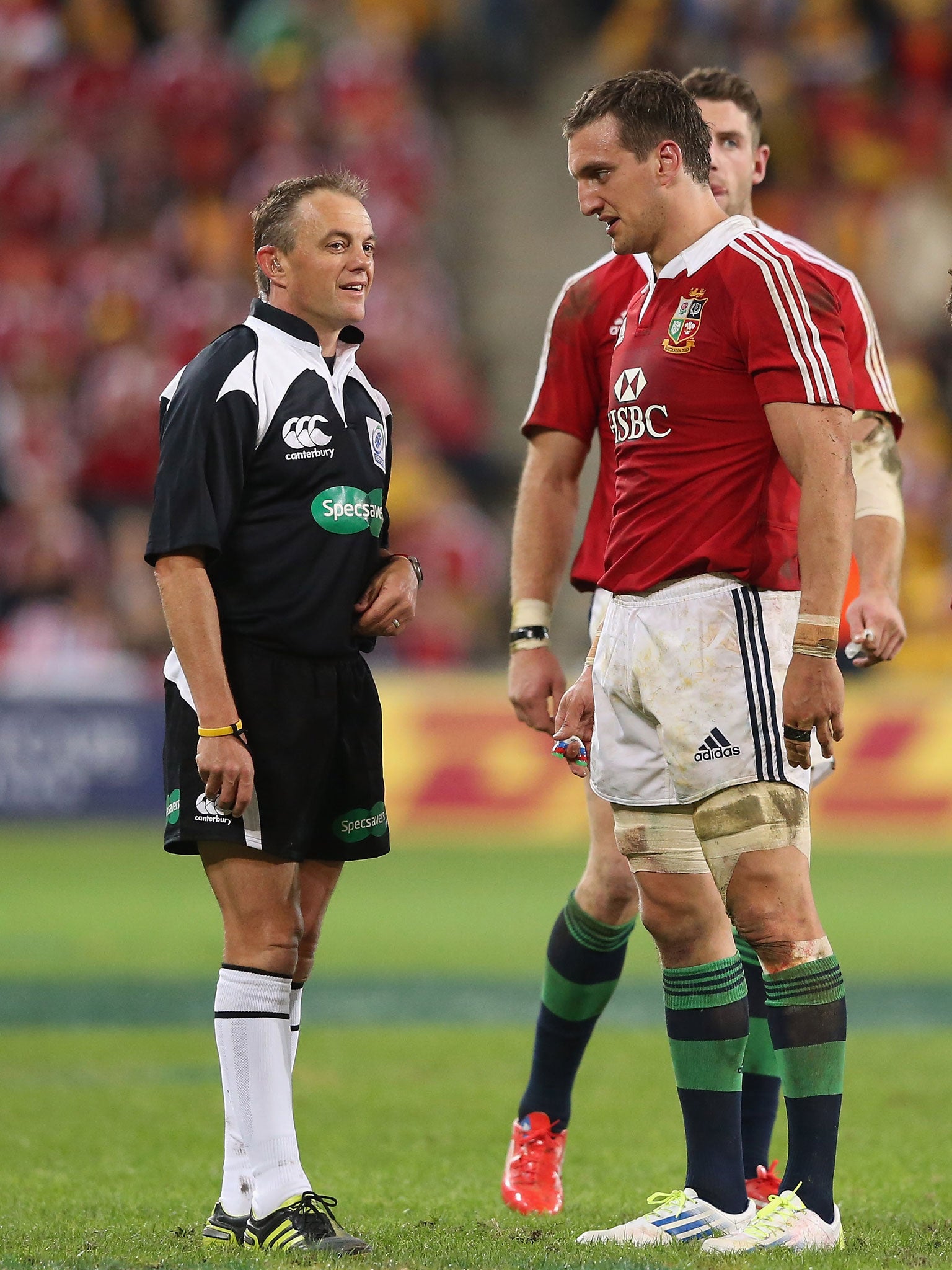James Lawton on the British and Irish Lions 2013: It's time to shine a light on murky world of rugby refereeing
When someone like Brian O'Driscoll wears a face of bewilderment you have a problem

If Brian O'Driscoll managed to ward off the temptation – just – non-combatants should probably refrain from saying that New Zealand referee Chris Pollock was a pygmy of outrageously subjective influence when he supervised the first Test giants.
This is no reason, though, for rugby's ruling body to ignore any longer the fact that it is presiding over two separate games, one played in the northern hemisphere, the other in the south, and that every showpiece game is now at the mercy of the absurdly arbitrary judgements of someone like Pollock.
Australia's latest phenomenon Israel Folau ran in two tries of dazzling accomplishment. George North responded for the Lions with a run worthy of breaking any game, anywhere in a grown-up world of sport.
But who was it that truly towered above the conflict, who constantly threatened to shape the outcome? It wasn't the wing behemoths with their startling ability. It wasn't the quick-silver Jonny Sexton or the ill-starred Kurtley Beale.
It was the man with the whistle, the one whose judgement in the vital area of the breakdown was deemed by Warren Gatland, the Lions coach, to be nothing less than "crucifying" . When someone as experienced as O'Driscoll, a former Lions captain on his record-equalling fourth tour, wears a face of absolute bewilderment, when he admits later that he could not trust himself to indulge his scavenging genius for work around the tackle, you know you have a problem.
You have a great player operating in an alien language. You have superb professionals at the mercy of whim.
It did not help that Pollock, who also bemused the Lions when he withdrew with what seemed indecent haste an advantage immediately before Will Genia launched a potentially killing counter-attack, received a constant stream of encouragement from his touch-judge Craig Joubert.
Joubert has created plenty of mystery and outrage in his own right when officiating in the northern hemisphere and in France the South African will probably never be forgiven for his performance in the World Cup final of 2011 in Auckland. The French, who outplayed the All Blacks in the second half before losing by a point, were bitter about Joubert's interpretation of the game. However, the coach Marc Lièvremont was at pains not to express it publicly.
He said that after meeting the referee two days before the final he swore to himself that whatever happened he would make no reference to the referee. Plainly, Lièvremont feared the worst – and soon enough there was reason enough to understand why.
We can only speculate on the degree of Gatland's public rage had the mis-firing Beale landed one of his two late penalty attempts. As it was, the Lions' narrow victory was a buffer against the kind of explosion which would surely have soured the climate far more than the coach's relatively measured criticisms of the referee's effort.
One barb guaranteed to sail home was Gatland's assertion that, "it is very difficult to step up from the provincial level to referee in the Test arena".
Most guaranteed to provoke indignation is one defence of Pollock's handling of the breakdown. In his familiar terrain of Super Rugby, it is said Pollock operates on the theory that the flow of the game is paramount, so that when a breakdown forager like O'Driscoll applies himself he is not so much performing a sterling service for his team, but lowering the entertainment level.
On several early occasions O'Driscoll argued politely that he was operating within the laws of the game fastidiously. He then withdrew from the discussion, concluding that however much he stayed on his feet, he was still in danger of going off his head.
None of this touches upon the technical nuances of rocket science. It is concerned with logically codified rules which should leave the rawest of international players as aware as an old war dog like O'Driscoll of what he can and cannot do.
Instead, in one of the most crucial areas of the game, rugby turns itself into a matter of chance. The advantage rule is also as contracted or as stretched as a Pollock deigns.
Technology is embraced thoroughly on the important question of whether a try has been scored, which is to rugby's immense credit when the absurd delay in football is considered. Fortunately, at its best, the round ball has a beautiful simplicity that is understood by all. In rugby, even the cognoscenti are condemned to serial confusion. Most calamitously, players of the greatest distinction and experience are also plunged into the fog.
That they did not finish up thoroughly lost was a fate narrowly avoided by the Lions in Brisbane. They can only hope that they will be able to see more clearly in Melbourne next weekend. Surely it is time to shine a little light in an extremely murky place?
Subscribe to Independent Premium to bookmark this article
Want to bookmark your favourite articles and stories to read or reference later? Start your Independent Premium subscription today.

Join our commenting forum
Join thought-provoking conversations, follow other Independent readers and see their replies